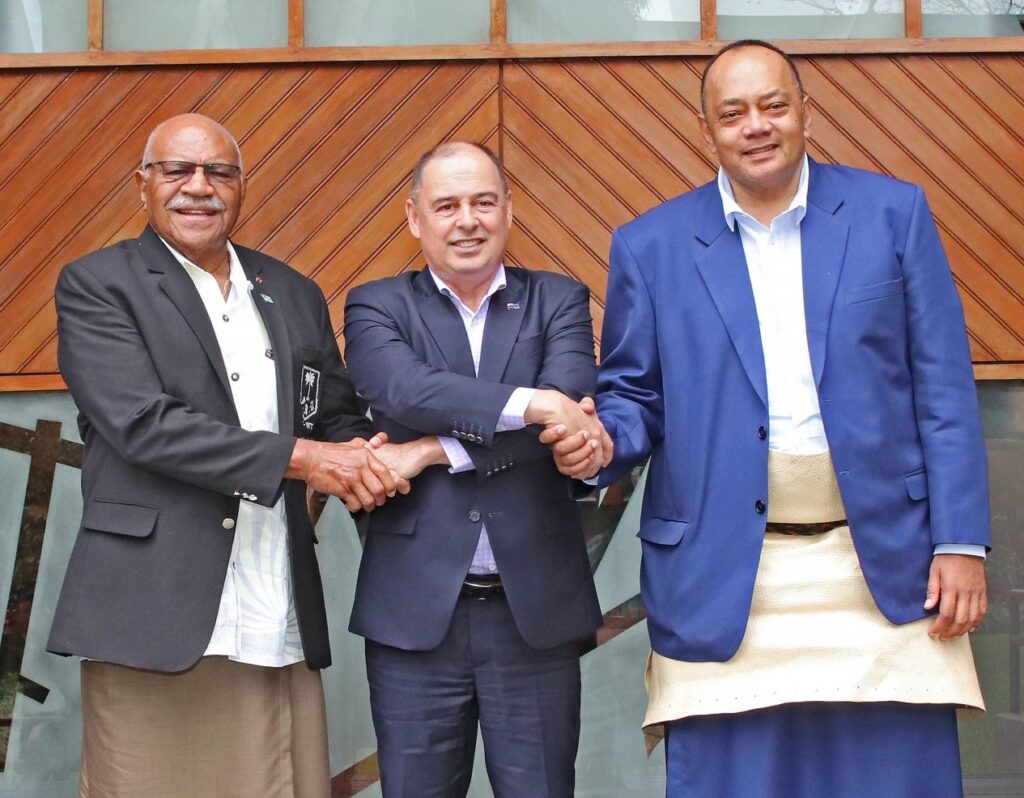Tonga – the 6th most climate vulnerable nation in the World hosts Pacific leaders this week. Tonga grabbed international attention last in 2021 in the aftermath of the tragic eruption of the Hunga Tonga-Hunga Ha-apai Volcano. Deaths, injuries and the scale of damage to its infrastructure shocked the World.
Since then Tonga has been hit by several cyclones. Its public debt has grown to well over 40 percent of its GDP. Fiscal pressures constraint its ability to make greater progress on its global development goals (SDG’s). Financial pressures are a severe constraint on its ability to respond to future climate catastrophes. Tonga, like the rest of the Pacific needs a better strategy to meet challenges of a post 1.5 Celsius warmed world.
When Tonga’s Prime Minister,Hu’akavemeiliku Siaosi Sovaleni chairs the 53rd meeting of the leaders of the Blue Pacific this week, he will shape Pacific’s priorities for the year. He will do so wisely, thoughtfully and in a manner that is inclusive of the diverse views among his fellow leaders.
The Kingdom has presented its vision for a transformative and resilient Pacifica. To get to that, the region needs to begin to build better now.
Building resilience better across the Blue Pacific begins from strong leadership at the regional level. But equally this is a question about the depth of the region’s partnerships and the scale of resources that are available to our region. Tonga has rightly said that the World’s most climate vulnerable region need to build its resilience now – during this decade. Urgency is existential.
The Pacific’s leaders have a full agenda. They will consider the associate membership of Guam and American Samoa into the Forum family. This brings the US more firmly into the Pacific family. The USA has taken time to realise that it is a Pacific power. This should be broadly welcomed even if decades late.
Pathway and timeframe for decolonisation of New Caledonia
Pacific’s leaders will anguish on how best to frame its approach to the steps that are now needed to conclude the decolonisation in New Caledonia. Many will argue that time for slow incremental evolution has passed and that time bound steps needs to be agreed to. The MSG subgroup of leaders may argue that PIF should take an elevated role in ensuring that New Caledonia’s decolonisation is completed without any further violence.
Pacific’s leaders will undertake further steps to operationalise the Pacific Resilience Facility. Leaders may discuss transnational crime and its growing implications for their domestic economies and societies and a host other standing items including the implementation of our 2050 Strategy – the Blue Pacific’s Southern Cross.
An unforgiving geopolitical environment
Pacific’s leaders know that they are meeting against the backdrop of a global environment that has not been this challenging for many years. The raging conflict in the Mid-East and in Ukraine continues to consume much of the oxygen internationally.
Geopolitical contestation across the Blue Pacific – the part of the broader Pacific that is the collective EEZ of island states has not seen this intense contestation for decades. This contestation occurs across all domains – maritime, seabed, space and of course on land and especially in the resource sectors.
The risk of miscalculations and of conflicts in the Blue Pacific arising from misunderstandings between superpowers have never been higher. Pacific’s leaders know this intimately.
Pacific’s leaders will also know that in a new geopolitically supercharged international environment, the voices of small island states in the larger forums where the great decisions of our times are taken have become even more muted. The interests of the superpowers and of large developing states often overwrite discussions that are of interest to small states. Small states feel claustrophobic in these global spaces.
Against this backdrop, it falls on Tonga as the Chair to reset and energise the Pacific’s international diplomacy. So many of the small and the large policy fixes that are needed will be taken in boardrooms well beyond the shores of the Blue Pacific.
First Pacific Leaders Meeting in a post 1.5 Celsius increase world?
The World has possibly breached the 1.5 Celsius global warming target last year. This may be the first meeting of Pacific leaders against this backdrop. It may be years before the world returns to the 1.5 C pathway. This matters to the whole World . It matters to the Pacific in an existential way.
The 1.5 Celsius target is Pacific’s guardrail against a persistent climate chaos. Each decimal point increase above 1.5 C means that adaption of Pacific’s economies becomes that much harder. Each additional decimal point means that adaptation becomes costlier by at least 15 percent.
If the World breaches the 2.0 Celsius degree increase, much of the adaption in the Blue Pacific becomes impossible. Temperature increase above 2.0 Celsius means that many infrastructure programs already underway will need to go right back to the drawing board. Its that simple. The region will need to consider building standards capable of responding to Category 6 and 7 cyclones – categories that do not exist today but that we should now be preparing and building for.
Finance ministers of the region have been persistent in raising alarm bells about not having the fiscal space to expand their development effort while maintaining their capabilities to respond to the next crisis. Costs of repairing damages caused by more intense storms and the more rapid deterioration of their infrastructure are growing. Responding to them eats into their efforts to expand health care and improve the quality of education. The trade-offs are alarming. Some considerations for Pacific’s Leaders are proposed against this backdrop.
PIF leaders on war footing
Firstly, PIF Leaders will be well advised to call out unequivocally that a World that fails to live up to its commitments under Paris Treaty is nothing short of a declaration of war on Pacific island states and on their communities. Bringing an end to the War on Ukraine matters for peace in Europe. Bringing an end to the climate war matters for peace and security across the Blue Pacific.
The small states need deep and enduring partnerships – not fair-weather partnership. The depth of partnerships with the Pacific will be decided not by the number of zeros on aid checkbooks, but by the clarity of commitments to limiting global warming to no more than 1.5 Celsius and not a decimal point more. I am certain that PIF Chair will find an elegant way of expressing this. Elegance is the hallmark of Tongan diplomacy.
Secondly, Pacific’s leaders will undertake first significant steps to operationalize their homegrown climate financing facility – the Pacific Resilience Facility (PRF). This is big deal. They will seek significant financial commitments to establish and operationalize the Pacific’s self managed climate finance facility. They will welcome the support of UN Secretary General Antonio Guterres in helping to mobilise financial commitments internationally.
Homegrown response to climate change
The PRF is crucial for an accelerated response to climate crisis across the region. Pacific seeks to change the game. Rather than be dependent on charity and on the slow disbursing international instruments such as the GCF, they want to begin to shape and drive their own response to climate change. If the region does this well, there is no reason why the PRF cannot grow into the Pacific’s own development bank in future – a crucial step for protecting the sovereignty of the region in the medium term. I hope some leaders are beginning to contemplate this future as well.
Thirdly, Pacific’s leaders will do well to agree in the clearest and simplest way to its climate ask internationally. They need climate funds to flow at ten times the multiples of where they are today. Estimates at the low end range between $1.5 to $2 Billion USD annually. Clarity about its collective climate finance ask should frame its international diplomacy – at the climate COP in Azerbaijan and in their regional meetings with development partners. While the World struggles to agree to framing and financing the new global climate finance target, the Pacific should seek a holding solution to its growing needs. There may be a Tongan and Pacific time for everything else – not so for responding to the climate crisis.
Pacific island states climate debt – the debt that they have undertaken for recovery and rehabilitation from climate change needs to written-off. Period. This will give them back some fiscal space necessary for funding their development. Their adaptation needs to be considerably accelerated. This is exceptionally significant for Pacific small island states where the window for adaptation is short and narrowing – often less than 10 years. Adaptation finance needs to be expanded by many multiples.
Fourthly , as the Pacific community welcomes the Uto ni Yalo on its voyage from Fiji, I hope this brings a far stronger focus on the Blue Economy. The Blue Pacific is one of the World’s lungs. Its maritime resources is ours. But this is contested.
The Blue Pacific was the World’s first nuclear free region. Pacific’s leaders may declare the Blue Pacific to be an Ocean of Peace. Through such a Declaration, they may provide clearer guidance for expanding the protection and conservation of marine spaces regionally. They may initiate new mechanisms for mobilising blue investments for the sustainable management of their precious maritime resources.
Leaders may initiate efforts to develop regional instruments to resolve ocean related challenges such as those arising from potential sea bed mining in future. They may propose obligations on their partners and their friends on sharing information on activities in the Blue Pacific including those that are security related. The region needs to work systematically to destress potential flash points proactively. Its solidarity can be harmed if it fails to do so.
Finally, many Pacific’s leaders will reconvene at the United Nations at its annual General Assembly in New York in a few weeks time. Even in this difficult global environment, the UN Secretary General who will be in attendance in Tonga for the first time, convene a Summit for the Future. Pacific’s leaders would do well to take a cohesive view in the lead to this Summit.
They may use the Summit of the Future to extend their call for a substantial transformation in the international financial architecture so that rather than working against the interests of small island states- they finally pivot to begin to work for them. They may want to signal how they see our region becoming an equal and not an excluded part of a digitally interconnected world. They may seek assurances from the international system that rules and procedures of international governance that silence and marginalize the small states will be fixed so they have voice and influence across global system.
This is a hugely consequential meeting of Pacific. I join Pacific Islanders in wishing the Chair and our Leaders well in their deliberations. The stakes for Pacific Islanders could not be higher.
Dr Satyendra Prasad is Senior Fellow at Carnegie Endowment for International Peace; the Climate Lead for Abt Global and is the former Ambassador of Fiji to the United Nations. The opinions expressed here are his own.
Source: PACNEWS




